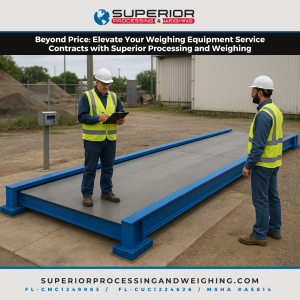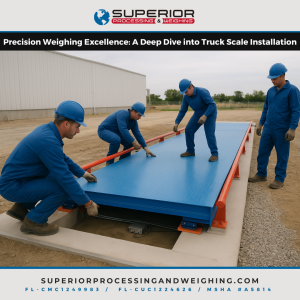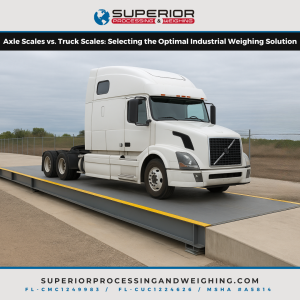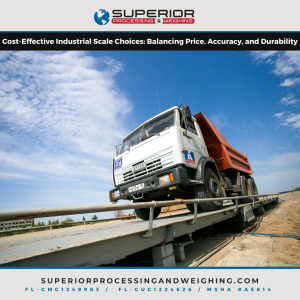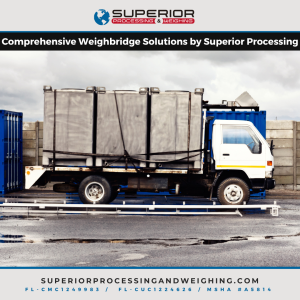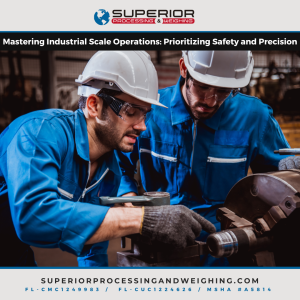Accurate weighing in industrial settings is indispensable. It affects product quality, regulatory compliance, and overall operational efficiency. For instance, in a manufacturing facility, precise weight measurements are crucial for inventory management, quality control, and cost efficiency. Similarly, in a recycling facility, accurate scaling ensures fair transactions and efficient resource allocation, while in automobile manufacturing, precise component weighing is critical for vehicle safety and performance.
At Superior Processing and Weighing, we specialize in providing precision industrial scales and ensuring they maintain their accuracy through regular calibration. Our commitment to excellence ensures that our clients can rely on their weighing instruments for accurate measurements, thereby optimizing their industrial processes.
Factors Influencing Calibration Frequency of Industrial Scales
Several factors determine the frequency of calibration for industrial scales. Understanding these factors is crucial for maintaining the accuracy and reliability of your weighing equipment.
Usage Frequency
The frequency of use significantly impacts how often a scale should be calibrated. Industrial scales in high-traffic areas, such as production lines or heavy-duty operations, require more frequent calibration checks. For such scales, we recommend monthly or even weekly calibration. In contrast, scales used less frequently may only need calibration every three to six months.
Environmental Conditions
The environment where the scale operates can also affect its accuracy. Factors like temperature fluctuations, humidity levels, and vibrations can impact scale performance. In industrial settings where these conditions are prevalent and uncontrolled, more frequent calibration may be necessary to ensure accuracy.
Type of Scale
Different types of scales have varying calibration needs. For example, bench industrial scales and heavy-duty industrial scales may require different calibration schedules based on their design and usage. At Superior Processing and Weighing, we tailor our calibration plans to meet the specific requirements of our clients’ equipment and operational demands.
Regulatory Requirements
Regulatory bodies often establish guidelines for calibration frequency in industrial settings. Staying informed about these regulations is crucial for compliance and maintaining operational standards. We help our clients navigate these requirements to ensure their scales meet all necessary standards.
Best Practices for Calibration of Industrial Scales
Ensuring the accuracy of industrial scales involves a meticulous calibration process. Here are some best practices we recommend:
Follow Manufacturer Guidelines
Every industrial scale comes with manufacturer specifications regarding calibration frequency and procedures. Adhering to these guidelines is essential for maintaining the accuracy and longevity of your scales. We encourage our clients to closely follow these recommendations.
Implement a Regular Schedule
Establishing a regular calibration schedule is vital for ensuring consistent accuracy. Incorporating calibration checks into routine maintenance schedules helps prevent discrepancies and maintain optimal performance. We assist our clients in developing and implementing these schedules.
Document Calibration Records
Keeping detailed records of calibration dates, results, and any adjustments made is crucial for tracking performance over time. This documentation serves as proof of compliance with regulatory requirements and helps in future calibrations. We provide comprehensive record-keeping solutions to our clients.
Use Qualified Professionals
Calibration should only be performed by trained professionals who understand the intricacies of the equipment involved. At Superior Processing and Weighing, our team of experts is dedicated to providing high-quality calibration services tailored to our clients’ needs. We ensure your scales are calibrated to the highest standards.
The Calibration Process for Industrial Scales
Understanding the calibration process is essential for maintaining the accuracy of your industrial scales. Here are the steps typically involved:
Step 1: Prepare the Scale
Before calibration begins, it is crucial to ensure that the scale is clean and free from any obstructions. Proper preparation is vital for obtaining accurate readings and avoiding potential errors during calibration.
Step 2: Use Certified Weights
We employ certified weights with known values to test the scale’s accuracy. These weights should cover the range of weights that the scale will typically measure. Using certified weights ensures the reliability of the calibration process.
Step 3: Take Readings
We place the certified weights on the scale one at a time, recording the measurements displayed. This step allows us to compare the actual weight with the displayed value, identifying any discrepancies.
Step 4: Adjust if Necessary
If discrepancies arise between the actual weight and the displayed measurement, we make the necessary adjustments according to manufacturer specifications. This step is crucial for ensuring the scale provides accurate readings.
Step 5: Record Results
Finally, we document the calibration results, including any adjustments made. This record serves as a reference for future calibrations and helps maintain accountability. Thorough documentation is key to maintaining consistent accuracy.
Benefits of Regular Calibration in Industrial Settings
Investing in regular calibration offers numerous benefits for industrial facilities:
Enhanced Operational Efficiency
Accurate scales contribute to more efficient operations by ensuring precise measurements. This accuracy helps in inventory management, quality control, and resource allocation. Our calibration services optimize your industrial processes for maximum efficiency.
Improved Compliance
Regular calibration helps industrial facilities meet regulatory requirements, avoiding penalties and maintaining their reputation. Compliance with standards is crucial for operational legality and reliability.
Increased Equipment Longevity
Regular maintenance and calibration can extend the lifespan of industrial scales, leading to cost savings in the long run. By ensuring your equipment remains accurate and functional, you minimize the need for frequent replacements.
Optimal Performance
Accurate scales contribute to better overall performance in industrial settings. This accuracy allows for more precise production processes, better quality products, and enhanced customer satisfaction.
Superior Processing and Weighing’s Commitment to Excellence
At Superior Processing and Weighing, we are committed to providing our clients with affordable industrial weighing solutions tailored to their unique needs. By emphasizing the importance of regular calibration and meticulous weighing, we help ensure that industrial facilities can rely on their instruments without question.
We encourage all industrial facilities to evaluate their current calibration practices and make necessary adjustments. By prioritizing accurate weighing, we contribute to improved operational efficiency and a higher standard of performance in various industrial sectors.


